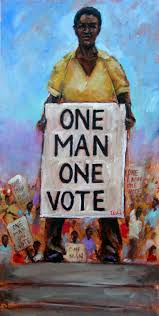Following close on the heels of the
close of elections,
the link to an article, with a rather disturbing
suggestion, found its way into my inbox. “Democratic elections” it suggested, “produce
mediocre leadership and policies.” This startling assertion was made a
Prof. David Dunning, psychologist at Cornell University, whose research apparently
demonstrated that “incompetent people are inherently unable to judge the
competence of other people, or the quality of those people's ideas.” Prof. Dunning is represented as having argued that given that most
people do not have the mental tools to make meaningful judgments, “no amount of
information or facts about political candidates can override the inherent
inability of many voters to accurately evaluate them. His final cut was even
worse, where he suggested that "very smart ideas are going to be hard for
people to adopt, because most people don’t have the sophistication to recognize
how good an idea is".

One could agree with Prof.
Dunning to a limited extent. Most people do not in fact possess the mental
tools to recognize the sophistication of certain ideas. Thus they simply fail
to see these ideas, and address these ideas at the most basic level. But we
will come to this point later. The first point we need to deal with is the
basic flaw in Prof. Dunning’s work, which is that "The democratic process
relies on the assumption that citizens (the majority of them, at least) can
recognize the best political candidate, or best policy idea, when they see it.”
This may be one of the arguments for direct democracy, but it is not a
foundational argument for democracy that rests on the idea that every person
must have a say in the way they are to be governed. The work of people like Dunning
is part of an elitist and rightist move, prevalent the world over, and also
visible in Goa and India, where we would like to restrict the role that ‘the
people’ and their legitimately elected representatives play in democracy on the
grounds that they are ‘uneducated’ ‘unqualified’ or such like. We would rather
have persons who are ‘educated’ and ‘capable’ (this is of course being just
another variant of that annoying upper-caste, anti-Mandal argument of ‘merit’).

There is no doubt that most of
the people may be making choices that in the long run are deeply detrimental to
the status quo; but this is one of the compromises that one makes when one
enters into democracy. For the sake of the principle of justice involved in
allowing everyone a say in the way they are governed, we acknowledge the
possibility that things will not always go our way. In doing so, we also
acknowledge the possibility that our way is not necessarily the best way.
Indeed, as one scholar pointed out, one the benefits of having a minority is that they often preserve options that the majority may not be particularly
inclined to think about at a particular moment in time.

The beauty with a democratic
setup however, is that merely because one has given up one’s right to make the
choices all the time, one has not surrendered all of one’s options. Given that
democracy is also about the right to argue one’s position and persuade others,
democracy is also a profoundly pedagogical system. Indeed, the great
Euro-American bourgeois democracies prior to the Great War, and subsequently
the welfare democracies after the end of the II World War were substantially
based on education. This pedagogical exercise was not limited only to schools
however, but extended to creating a public sphere where people outside of privileged
backgrounds could imbibe what were essentially aristocratic and bourgeois
ideals and sensibilities. Museums, opera houses, public parks, all of these
ensured that a certain sensibility was imparted to persons who could not
earlier ‘see’. A good amount of this exercise rested on philanthropic work
given that these elites recognized that the continuation of the status-quo
rested on the creation of a group of people who even if they could not see as
clearly as the leading elites, would at least acquiesce to the decisions that
were being made.

What Dunning’s work represents is
a certain global breakdown of this earlier democratic strategy, in the face of
neo-liberalism and the growing trend toward privatization. Part of the new
strategy now rests on confirming the absolute, congenital even, impossibility of certain groups
to participate in democracy, laying the foundations for the nakedly oligarchic
control of the State that must definitely follow. One could still follow the
Greek ideal and call it a democracy, just as we are prone to calling the
communidade- gãocaria system democratic, but both these system rested on
forced and unfairly unremunerated labour.

In Goa, there was a valiant
attempt, in the shape of the Konkani language movement, and led to a large
extent by the Konkani Bhasha Mandal to follow this European ideal of forging a
public with a common (Konkani) consciousness. The trouble with that effort was
its timing. The period of crafting a common language as the basis of a (sub)
national democratic public had long past. Furthermore, given the cussed
parochial tendencies of the KBM and other Konkani language groups, anything
that did not fit into their idea of what Konkani or Indian could be, was cast
out. This was especially mistaken because of the sophisticated tastes of the
average Goan, open to, as a result of so much migration, influences from all
over the subcontinent and the world. Add to this the supercilious caste
prejudice that only a certain kind of Konkani could be Konkani and they sealed
the fate of their project.

In a Goa where we lament so much
about the ‘bad’ choices that the ‘common’ man is making, it behooves those of
us who moan and crib to engage in a project of education of these masses. There
is no doubt that choices are being made that will lead us down the road to
hell. And yet, there does not seem to be a broad enough consistent effort to
engage these masses with a larger pedagogic project. A project that while being philanthropic in nature is decidedly not populist. On the contrary when one
does have opportunities, like the IFFI for example, one sees the resort to that old Roman strategy of
Panem et circenses, where rather than encouraging the
public to engage with nuanced cinema, they are treated to a common carnival.

One particularly noteworthy
effort however, that runs contrary to the prevalent strategy, is that of the D.D. Kosambi Festival of Ideas. Despite the debatable
caliber of more recent speakers at this festival, it is one of the more
interesting attempts at engaging the public, especially given the size of the
audience it manages to muster. One wishes however that this festival either traveled across Goa, or that other towns in Goa saw similar festivals of such
caliber.

In sum, while it is true that not
all start with the capacity to make reasoned and nuanced decisions when faced with
electoral or other political choices, this lack is not a congenital impediment.
It is one that can be rectified though a systematic engagement with these
groups where we hope to win these groups over to our point of view. When they
fail to be won over however, rather than turn around and blame the democratic
system, we need to recognize that perhaps there is a reason why our point of
view is not being accepted in the first place, and go back to the drawing
board. In short, we would need to suck it up for the moment, while continuing with the longer project of public engagement.
(A version of this post was first published in the Gomantak Times dtd 6 March 2012)

1 comment:
Well written, Jason.
Post a Comment